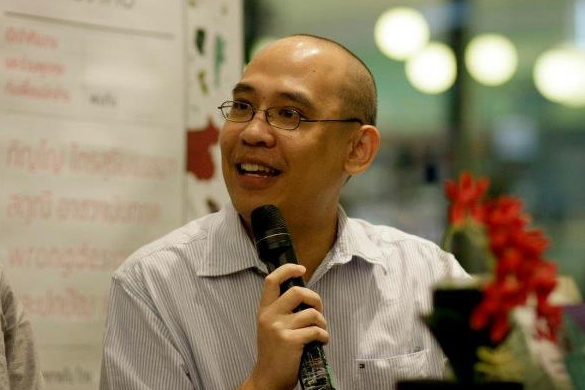Under the junta, where a free media is crucial for voicing people’s concerns, all people can hear from the Thailand’s so-called public television is “the sound of silence,” says an academic.
In The Creative Forum on 5 July 2017, Pokpong Chanwit, who conducted research in the 2009 performance evaluation project of Thai Public Broadcasting Service (ThaiPBS), delivered a speech calling on ThaiPBS to improve its internal management system and raise its voice for the people.
Pokpong said that after 10 years of operations, he, like many people, wants to see this professional public service media organization educate society and challenge the injustices and inequalities in society for the sake of the people.
ThaiPBS was founded on 15 January 2008 with the mission to be a public media organization for everyone. It has been financially supported by taxes collected from citizens, meaning that the media belongs to the people and it is supposed to stand for the people. But ThaiPBS is moving away from the people these days, according to Pokpong.
Pokpong stated that since the 2014 coup, Thai society is really in need of a public media organization to present an alternative to what the government says is the case, to be a spokesperson for freedom of the press and the people, and to uncover the stories that cannot be investigated. But all the people can hear from ThaiPBS so far is the sound of silence.
“If there really is silence, then it is a big problem. What is ThaiPBS for?
If it has raised its voice and no one has heard it, that’s another kind of problem where we have to figure out where the power of ThaiPBS disappeared. If there are people working inside and outside producers and there are networks determined to produce quality work and to be completely committed to public broadcasting, the question is that the power of these people is not getting through to create power in front of the screen.”
He further explained that public media can direct society towards progress if it performs its duty in an effective way. As a media organization, ThaiPBS has to ask itself whether it has done its duty in asking the right questions. Are we supporting useful public policies, reinforcing a democratic culture, and leading society through crises peacefully?
In the last three years, ThaiPBS have become more and more overlooked, resulting in a decrease in ratings. It was ranked 15th among all TV companies despite the fact that the channel gets a 2 billion baht annual subsidy from government.
Despite the advantage of financial support, ThaiPBS’ chances of beating the competition or winning popuarity are still slim. Perhaps it needs to adjust to its audience. ThaiPBS has to make a difference.
Pokpong suggested that ThaiPBS’ duty now is not only to produce quality programmes, but also to reach as big an audience as it can.
“If we blame the existing rating system because we’re not interested, we can’t use it, it’s no good, we must design our own rating system that we think well reflects the work of public media and use it to evaluate ourselves. … Even with their limitations, ratings are like GDP, which tells us many things and allows us to compare ourselves with others. … We have to live with ratings while understanding their limitations, not use them as an excuse for not making an effort.” said Pokpong.
He questioned the media’s long-standing management system, the importance of the policy committee, as well as power politics within the organization.
“After 10 years we may need to seriously think if [the system of governance] is appropriate for managing a media organization. … Another important issue is the degree of participation of those who have an interest in the organization, especially the staff, in the decision-making process and monitoring the executive.”
The reason for having a public broadcasting service must be to drive the media and move society forward, not to mark time at the point where society is at a standstill, he emphasized.

